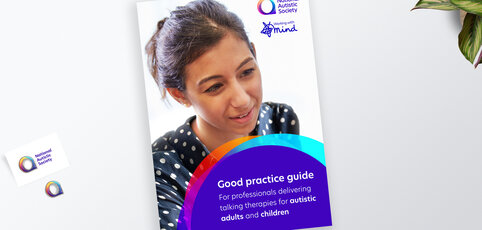Schizophrenia - a guide for professionals
Schizophrenia is a severe long-term mental health condition. It can cause a range of different psychological symptoms, including hallucinations and delusions. Being autistic and having schizophrenia is thought to be rare, but the research and evidence is very limited. Having schizophrenia can be an upsetting and scary experience, but with treatment it can be managed. This guide explores more about schizophrenia and autism, treatment and support options.
“Schizophrenia is a severe long-term mental health condition. It causes a range of different psychological symptoms. These include:
- hallucinations – hearing or seeing things that do not exist outside of the mind
- delusions – unusual beliefs not based on reality
- muddled thoughts based on hallucinations or delusions
- losing interest in everyday activities
- not caring about your personal hygiene
- wanting to avoid people, including friends.”
Delusions and hallucinations are types of psychosis. Psychosis is a symptom of certain mental health conditions, such as schizophrenia, rather than a diagnosis itself.
There is no single test for schizophrenia and it is usually diagnosed after assessment by a mental health specialist. Symptoms need to occur for at least one month for a diagnosis of schizophrenia.
Schizophrenia is a lifelong condition that can make distinguishing reality from delusions very difficult. It can be extremely upsetting and distressing for the person experiencing it and can result in drastic changes in behaviour including becoming, angry, confused and suspicious of those around them. Schizophrenia can have a significant impact on relationships with friends, family and partners. Treatment and support is essential to help manage schizophrenia.
Very little is known about the relationship between autism and schizophrenia, including prevalence rates or any specific risk factors. With so little understanding of the relationship between autism and schizophrenia, it is possible that autistic people may be at risk of having the early signs of schizophrenia missed.
Some researchers and professionals suggest a reluctance from some professionals to diagnosis autism and mental health conditions is due to the overshadowing/overlapping of symptoms and traits. They suggest that professionals should carry out a detailed medical history to understand if an individual has a history of psychosis symptoms before diagnosing or choosing not to diagnose.
Getting help with schizophrenia
Schizophrenia is a complex and extreme mental health condition and is often treated through community mental health teams. If you support someone who you feel may have schizophrenia or be experiencing psychosis, encourage them and their family to contact their GP for referral to the appropriate local mental health team.
You can also visit our mental health support page for more information about seeking help.
Treatment for schizophrenia
There are no specific guidelines on treatment for autistic people with schizophrenia but the National Institute for Health and Care Excellence (NICE) has produced guidelines for treating schizophrenia, one for children and young people and one for adults.
The NICE guidelines recommend treatment to include a combination of antipsychotic medication and psychological treatments, which include:
- cognitive behavioural therapy (CBT)
- family therapy
- arts therapy
NICE (2016) also offers guidance for professionals when supporting autistic adults with co-occurring mental health conditions. The guidance includes:
- Professionals should understand the core autism traits and how they can impact the treatment of co-occurring mental health conditions.
- Where professionals are unsure, they should consult with an autism team for advice on delivering or adapting treatments for an autistic adult.
- Adapt psychosocial interventions as advised by the NICE guidelines, such as:
- making interventions more structured: using visual and written information
- using plain English when communicating, avoiding metaphors and ambiguous phrases
- involving a family member or carer (if the autistic person agrees) to support during the intervention
NICE (2013) has similar guidance for supporting autistic children and young people but it does not reference or mention schizophrenia.
Autistic people with schizophrenia emphasise the importance of medication in managing and treating their schizophrenia.
Charities offering advice
There is no specific advice for autistic people with schizophrenia. If you are concerned about anyone you support, you should seek further help ad guidance. There are several charities and organisation that offer general help and information, such as Mind, Rethink Mental Illness, and the NHS.
Useful links
Personal accounts
The following accounts may share information and experiences that you may find distressing.







